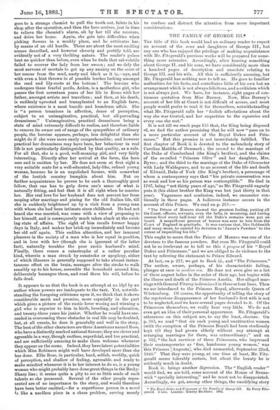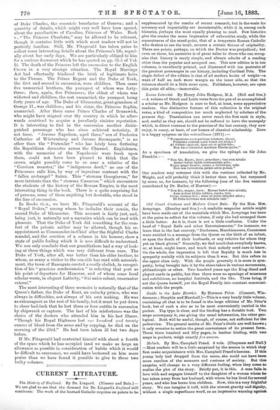THE FAMILY OF GEORGE III.* • TIIE title of this
book would lead an ordinary reader to expect
an account of the sons and daughters of George III., but any one who has enjoyed the privilege of making acquaintance with Mr. Fitzgerald's previous works will be prepared for some- thing more extensive. Accordingly, after hearing something about George II. and his sons, we have considerably more than a hundred pages of description and anecdote relating to George III. and his wife. All this is sufficiently amusing, but Mr. Fitzgerald has nothing new to tell us. He goes to familiar authorities for his facts, and contributes little of his own but an arrangement which is not always felicitous, and a criticism which is not always just. We have, for instance, eight pages of con- tinuous quotation from Miss Burney. Now, Miss Burney's account of her life at Court is not difficult of access, and most people would prefer to read it for themselves, notwithstanding what Mr. Fitzgerald calls her " foolish affectations about the way she was treated, and her coquetries to the equerries and every one she met."
It is not till we reach page 155 that, the King being disposed of, we find the author promising that he will now " pass on to a more particular account of the Royal Dukes and Prin- cesses." But this promise is not immediately fulfilled. The first chapter of Book ii. is devoted to the melancholy story of Caroline Matilda of Denmark ; the second to the marriage of
the Duke of Cumberland (the King's brother), and the claims of the so-called " Princess Olive " and her daughter, Mrs. Ry-ves ; and the third to the marriage of the Duke of Gloucester with Lady Waldegrave, and to an account of the life and death of Edward, Duke of York (the King's brother), a personage of whom a contemporary says that "hie private conversation was
as weak and low as his person was contemptible." He died in 1767, being " not thirty years of age," as Mr. Fitzgerald vaguely puts it (his eldest brother the King was but just thirty in that year). Vagueness and confusion, indeed, we encounter con- tinually in these pages. A ludicrous instance occurs in the account of this Prince. We read on p. 213 :—
"The Prince of Monaco showed the greatest feeling, putting all his Court, officers, servants, even the bells, in mourning, and having cannon fired every half-hoar till the Duke's remains were put on board. A magnificent present of horses was sent to him from the Court of England in gratitude. It was curious that, like Goldsmith and many more, he carried his devotion to James's Powders' to the extent of imperilling his life."
This ought to mean that the Prince of Monaco was one of the
devotees to the famous powders. But even Mr. Fitzgerald could not be so irrelevant as to tell ns this a propos of his " Royal
Dukes and Princesses." and we are obliged to do violence to the text by referring the statement to Prince Edward.
At last, on p. 217, we get to Book iii., and "The Princesses."
The author, aware, perhaps, of his characteristic failing, plunges at once in Inedias res. He does not even give us a list of these august ladies in the order of their age, but begins with
the illness and death of the Princess Amelia. Her alleged mar- riage with General Fitzroy is dismissed in three orfour lines. Then we are introduced to the Princess Royal, afterwards Queen of Wiirtemberg. Of course, the opportunity of telling the story of the mysterious disappearance of her husband's first wife is not to be neglected, and we have several pages devoted to it. Of the Princesses themselves, we really hear very little. We do not even get an idea of their personal appearance. Mr. Fitzgerald's utterances on this subject are, to say the least, obscure. On p. 303, we read " that six such young and unattractive women (with the exception of the Princess Royal) had been studiously kept till they had grown elderly without any attempt at arranging marriages for them, was extraordinary ;" and on p. 312, " the last survivor of these Princesses, who impressed their contemporaries as ' fine, handsome young women,' was this Princess [Augusta], who died unmarried, September 22nd, 1840." That they were young, at one time at least, Mr. Fitz- gerald seems tolerably certain, but about the beauty he is evidently much in doubt.
Book iv. brings another digression. The "English reader" would find, we are told, some account of the House of Bruns- wick " specially interesting," and he must not be disappointed. Accordingly, we get, among other things, the unedifying story
* The Royal Deices and Princesses of the Family of George III. By Percy Fitz- gerald. 2 vols. London: Tinsley Brt.thers. 1882. of Duke Charles, the eccentric benefactor of Geneva ; and a quantity of details, which might very well have been spared, about the peculiarities of Caroline, Princess of Wales. Book v.,"The Princess Charlotte," may be allowed to be relevant, though it contains little with which most readers will not be perfectly familiar. Still, Mr. Fitzgerald has taken pains to collect some interesting details about the Princess's life, especi- ally about her early days. We are particularly obliged to him for a curious document which he has quoted on pp. 31-5 of Vol. II. The death of the Princess left the succession to the English Crown in a very strange situation. The Royal Marriage Act had effectually hindered the birth of legitimate heirs to the Throne. The Prince Regent and the Duke of York, the first and second in succession, were childless. Then came five unmarried brothers, the youngest of whom was forty- three ; then, again, five Princesses, the eldest of whom was widowed and childless, the rest unmarried, the youngest being forty years of age. The Duke of Gloucester, great-grandson of George II., was childless ; and his sister, the Princess Sophia, unmarried. After these came Prince Charles of Brunswick, who might have reigned over the country in which he after- wards contrived to acquire a peculiarly sinister reputation. It is interesting to find in the succession another distin- guished personage who has since achieved notoriety, if not fame. " Jerome Napoleon, aged three," son of Frederica Catherine of Wiirtemberg and Jerome Buonaparte," is no other than the " Pretender " who has lately been fluttering the_Republican dovecotes across the Channel. Englishmen, with the memories of the Napoleonic wars fresh upon them, could not have been pleased to think that the crown might possibly come to so near a relative of the "Corsican monster," the "indigenous devil," as one of the Princesses calls him, by way of ingenious contrast with the "fallen archangel" Satan. This "stemma Georgiorum," far more intricate than the " stemma Cassarum " which encounters the students of the history of the Roman Empire, is the most interesting thing in the book. There is a quite surprising list of persons, some of them anything but desirable, who stood in the line of succession.
In Books vi.-x., we have Mr. Fitzgerald's account of the "Royal Dukes," among whom he includes their cousin, the second Duke of Gloucester. This account is fairly just, and, being just, is naturally not a narrative which can be read with pleasure. That the Duke of York did something for the com- fort of the private soldier may be- allowed, though his re- appointment as Commander-in-Chief after the frightful Clarke scandal, and the erection of a column in his honour, show a state of public feeling which it is now difficult to understand. We can only conclude that our grandfathers had a way of look- ing at these things which was very different from ours. The Duke of York, after all, was better than his elder brother, to whom, as many a visitor to the sea-side has read with astonish- ment, the town of Ramsgate erected a costly obelisk, in recogni- tion of his " gracious condescension " in selecting that port as his point of departure for Hanover, and of whom some local scholar wrote, in elegant Latinity, "Sul unite colunt, venerantur externi."
The most interesting of these memoirs is naturally that of the Queen's father, the Duke of Kent, an unlucky prince, who was always in difficulties, not always of his own making. He was as extravagant as the rest of his family, but it must be put down to sheer bad-luck that he lost three or four outfits in succession by shipwreck or capture. The last of his misfortunes was the choice of the doctors who attended him in his last illness. "Though his Royal Highness lost one hundred and twenty ounces of blood from the arms and by cupping, he died on the morning of the 23rd." He had been taken ill but two days before.
If Mr. Fitzgerald had contented himself with about a fourth of the space which he has occupied (and we make as large an allowance as possible in consideration of habits which it would be difficult to overcome), we could have bestowed on him more praise than we have found it possible to give to these two bulky volumes.



































 Previous page
Previous page